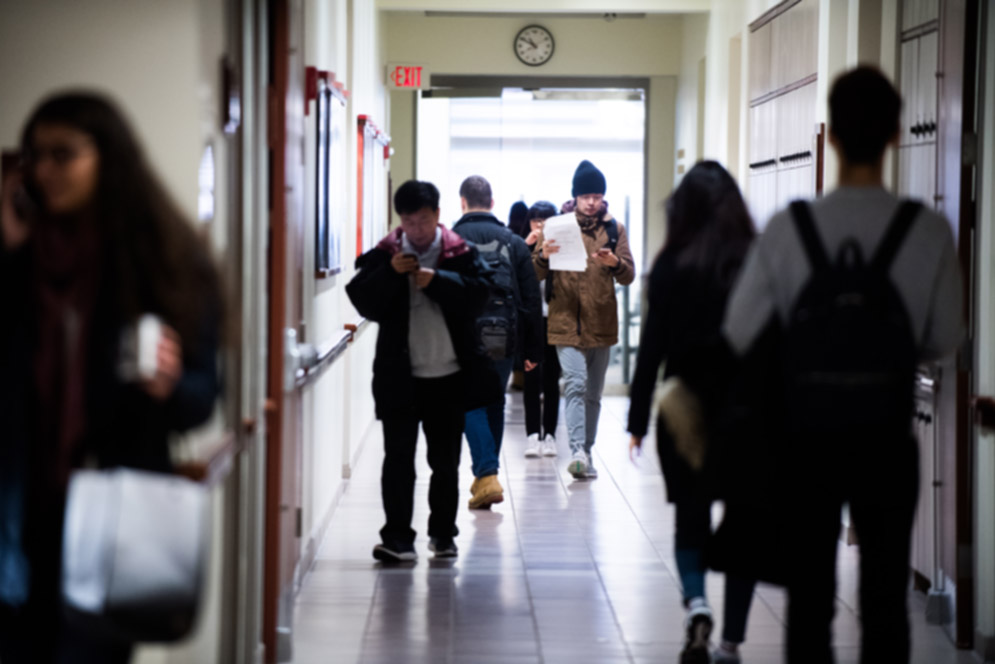Students Urged to Take AAU Sexual Misconduct Survey
BU among 33 schools seeking data on harassment, violence, with March 2 response deadline

All BU degree-seeking graduate, undergraduate, and CELOP students are requested to take an online survey about their experiences with sexual misconduct on campus. The deadline for completing the survey is March 2. Photo by Jackie Ricciardi
For the second time in four years, BU students are being asked to take a sexual misconduct survey designed to provide insight into the types and frequency of sexual assault and harassment on campus.
The online survey, which launched February 1, is being conducted by the private research organization Westat for the Association of American Universities (AAU). BU is one of 33 universities taking part; students have until March 2 to complete the 20-minute questionnaire.
Westat emailed a link to the questions individually to “all degree-seeking graduate and undergraduate students,” as well as students at the Center for English Language & Orientation Programs, says Kenneth Elmore (Wheelock’87), associate provost and dean of students. Westat will not disclose individuals’ responses, he says.
“This survey is an important opportunity for us as a community to take a hard look at ourselves,” says Jean Morrison, University provost, “and make any necessary adjustments in support of our commitment to providing a safe and respectful environment in which to work, study, and live. We encourage all students to participate and share their thoughts, experiences, and concerns on this issue.”
The University asked students about sexual misconduct on campus in 2015, using a BU-designed survey. This year, the University is participating in the AAU’s effort, one of the largest such endeavors ever covering colleges and universities, with a total of one million undergraduate, graduate, and professional students.
“It’s going to ask about students’ general knowledge and beliefs about social situations and their perception of sexual misconduct,” Elmore says. It will also probe for any personal experiences with harassment or violence that students have had, as well as their knowledge of rules, policies, and procedures governing the handling of sexual assault and misconduct and the resources available at their schools to assist victims.
The wealth of data from a multi-institution survey will enable BU to compare itself to peer institutions, Morrison says, in addition to assessing the extent of any problems here.
Given the sensitivity of the subject, the survey includes a consent statement for students as well as a trigger warning about the explicit nature of some questions. It also includes links to on- and off-campus resources for students who may find questions upsetting.
BU will release the aggregate results of this survey publicly, as it did with its 2015 sampling. That study found that 90 percent of respondents felt safe on campus and that three quarters felt the administration cared about their welfare. But almost a quarter of female students reported having been sexually assaulted in some way while attending the University.
The 2015 findings helped the University design programs such as its Sexual Assault Response & Prevention Center and publicize prevention and redress measures for sexual misconduct.
Those measures include a College of Arts & Sciences elective course for first-year students addressing healthy consent and communication about sexuality; support groups for victims of assault and of abusive relationships; weekly reviews of assault cases by a team from several University offices; and BU’s use of a judicial database with statistics on student conduct, gathered from the annual federal Clery report of campus crimes.
Experts say that the four-year interval between surveys affords time for universities to study their results and come up with strategies for addressing any problems uncovered by a survey.
To encourage students to take the survey, the University is offering to donate $5 to the student’s choice of one of four anti-violence initiatives: the Boston Area Rape Crisis Center, the Boston Medical Center Domestic Violence Program, the Network/La Red, or the Victim Rights Law Center. Student names will not be released to the beneficiary they choose.
Rich Barlow can be reached at barlowr@bu.edu.

Comments & Discussion
Boston University moderates comments to facilitate an informed, substantive, civil conversation. Abusive, profane, self-promotional, misleading, incoherent or off-topic comments will be rejected. Moderators are staffed during regular business hours (EST) and can only accept comments written in English. Statistics or facts must include a citation or a link to the citation.